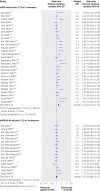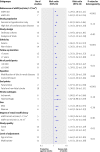Low glomerular filtration rate and risk of stroke: meta-analysis - PubMed (original) (raw)
Meta-Analysis
Low glomerular filtration rate and risk of stroke: meta-analysis
Meng Lee et al. BMJ. 2010.
Abstract
Objective: To qualitatively and quantitatively investigate the link between a low estimated glomerular filtration rate (eGFR) at baseline and risk of future stroke.
Design: Systematic review and meta-analysis of prospective studies.
Data sources: PubMed (1966-October 2009) and Embase (1947-October 2009). Selection criteria Inclusion criteria were studies that prospectively collected data within cohort studies or clinical trials, estimated glomerular filtration rate at baseline using the modification of diet in renal disease or Cockcroft-Gault equations, assessed incident stroke, had a follow-up of at least one year, and reported quantitative estimates of multivariate adjusted relative risk and 95% confidence interval for stroke associated with an eGFR of 60-90 ml/min/1.73 m(2) or <60 ml/min/1.73 m(2). Data abstraction Two investigators independently abstracted data from eligible studies. Estimates were combined using a random effects model. Heterogeneity was assessed by P value of χ(2) statistics and I(2). Publication bias was assessed by visual examination of funnel plots.
Results: 21 articles derived from 33 prospective studies: 14 articles assessed eGFR <60 ml/min/1.73 m(2) and seven assessed eGRF at both <60 ml/min/1.73 m(2) and 60-90 ml/min/1.73 m(2) for a total of 284 672 participants (follow-up 3.2-15 years) with 7863 stroke events. Incident stroke risk increased among participants with an eGFR <60 ml/min/1.73 m(2) (relative risk 1.43, 95% confidence interval 1.31 to 1.57; P<0.001) but not among those with an eGFR of 60-90 ml/min/1.73 m(2) (1.07, 0.98 to 1.17; P=0.15). Significant heterogeneity existed between estimates among patients with an eGFR <60 ml/min/1.73 m(2) (P<0.001). In subgroup analyses among participants with an eGFR <60 ml/min/1.73 m(2), heterogeneity was significant in Asians compared with non-Asians (1.96, 1.73 to 2.23 v 1.25, 1.16 to 1.35; P<0.001), and those with an eGFR of 40-60 ml/min/1.73 m(2) v <40 ml/min/1.73 m(2) (1.28, 1.04 to 1.56 v 1.77, 1.32 to 2.38; P<0.01).
Conclusions: A baseline eGFR <60 ml/min/1.73 m(2) was independently related to incident stroke across a variety of participants and study designs. Prompt and appropriate implementation of established strategies for reduction of vascular risk in people with know renal insufficiency may prevent future strokes.
Conflict of interest statement
Competing interests: All authors have completed the Unified Competing Interest form at www.icmje.org/coi\_disclosure.pdf (available on request from the corresponding author) and declare: no support from any company for the submitted work; no financial relationships with any companies that might have an interest in the submitted work in the previous 3 years; no other relationships or activities that could appear to have influenced the submitted work.
Figures
Fig 1 Flow of study selection
Fig 2 Risk ratio for association of estimated glomerular filtration rate (eGFR) and risk of stroke in prospective cohort studies. *Subgroups of estimates with eGFR <60 ml/min/1.73 m2. †Subgroups of estimates with eGFR 60-90 ml/min/1.73 m2
Fig 3 Subgroup analyses for comparison between studies reporting associations of estimated glomerular filtration rate (eGFR) <60 ml/min/1.73 m2 with risk of stroke
Fig 4 Interaction between estimated glomerular filtration rate (eGFR) and albuminuria, using groups with eGFR >60 ml/min/1.73 m2 without albuminuria as reference
Comment in
- Glomerular filtration rate and the risk of stroke.
Perkovic V, Cass A. Perkovic V, et al. BMJ. 2010 Sep 30;341:c4390. doi: 10.1136/bmj.c4390. BMJ. 2010. PMID: 20884697 No abstract available.
Similar articles
- Early referral strategies for management of people with markers of renal disease: a systematic review of the evidence of clinical effectiveness, cost-effectiveness and economic analysis.
Black C, Sharma P, Scotland G, McCullough K, McGurn D, Robertson L, Fluck N, MacLeod A, McNamee P, Prescott G, Smith C. Black C, et al. Health Technol Assess. 2010 Apr;14(21):1-184. doi: 10.3310/hta14210. Health Technol Assess. 2010. PMID: 20441712 - Synbiotics, prebiotics and probiotics for people with chronic kidney disease.
Cooper TE, Khalid R, Chan S, Craig JC, Hawley CM, Howell M, Johnson DW, Jaure A, Teixeira-Pinto A, Wong G. Cooper TE, et al. Cochrane Database Syst Rev. 2023 Oct 23;10(10):CD013631. doi: 10.1002/14651858.CD013631.pub2. Cochrane Database Syst Rev. 2023. PMID: 37870148 Free PMC article. - Angiotensin-converting enzyme inhibitors and angiotensin receptor blockers for adults with early (stage 1 to 3) non-diabetic chronic kidney disease.
Sharma P, Blackburn RC, Parke CL, McCullough K, Marks A, Black C. Sharma P, et al. Cochrane Database Syst Rev. 2011 Oct 5;(10):CD007751. doi: 10.1002/14651858.CD007751.pub2. Cochrane Database Syst Rev. 2011. PMID: 21975774 Updated. - Angiotensin-converting enzyme inhibitors and angiotensin receptor blockers for adults with early (stage 1 to 3) non-diabetic chronic kidney disease.
Cooper TE, Teng C, Tunnicliffe DJ, Cashmore BA, Strippoli GF. Cooper TE, et al. Cochrane Database Syst Rev. 2023 Jul 19;7(7):CD007751. doi: 10.1002/14651858.CD007751.pub3. Cochrane Database Syst Rev. 2023. PMID: 37466151 Free PMC article. - Altered dietary salt intake for preventing diabetic kidney disease and its progression.
Hodson EM, Cooper TE. Hodson EM, et al. Cochrane Database Syst Rev. 2023 Jan 16;1(1):CD006763. doi: 10.1002/14651858.CD006763.pub3. Cochrane Database Syst Rev. 2023. PMID: 36645291 Free PMC article.
Cited by
- Epidemiology and risk of cardiovascular disease in populations with chronic kidney disease.
Matsushita K, Ballew SH, Wang AY, Kalyesubula R, Schaeffner E, Agarwal R. Matsushita K, et al. Nat Rev Nephrol. 2022 Nov;18(11):696-707. doi: 10.1038/s41581-022-00616-6. Epub 2022 Sep 14. Nat Rev Nephrol. 2022. PMID: 36104509 Review. - Associations of blood biomarkers with glomerular filtration rate in patients with TIA and stroke: population-based study.
Kelly DM, Li L, Burgess AI, Poole DL, Duerden JM, Rothwell PM. Kelly DM, et al. Stroke Vasc Neurol. 2021 Mar;6(1):48-56. doi: 10.1136/svn-2020-000422. Epub 2020 Sep 3. Stroke Vasc Neurol. 2021. PMID: 32883874 Free PMC article. - Cardiovascular/stroke risk predictive calculators: a comparison between statistical and machine learning models.
Jamthikar A, Gupta D, Saba L, Khanna NN, Araki T, Viskovic K, Mavrogeni S, Laird JR, Pareek G, Miner M, Sfikakis PP, Protogerou A, Viswanathan V, Sharma A, Nicolaides A, Kitas GD, Suri JS. Jamthikar A, et al. Cardiovasc Diagn Ther. 2020 Aug;10(4):919-938. doi: 10.21037/cdt.2020.01.07. Cardiovasc Diagn Ther. 2020. PMID: 32968651 Free PMC article. - Low Creatinine Clearance Is a Risk Factor for Severe Cardioembolic Stroke in Japanese Female Patients.
Sakai S, Hagii J, Shikanai S, Sorimachi Y, Hamaura S, Yamazaki K, Yamada N, Shiroto H, Saito S, Kamada T, Takanashi S, Okumura K, Tomita H. Sakai S, et al. In Vivo. 2023 Jan-Feb;37(1):336-344. doi: 10.21873/invivo.13084. In Vivo. 2023. PMID: 36593049 Free PMC article. - Prescription of DOACs in Patients with Atrial Fibrillation at Different Stages of Renal Insufficiency.
Hahn K, Lamparter M. Hahn K, et al. Adv Ther. 2023 Oct;40(10):4264-4281. doi: 10.1007/s12325-023-02544-8. Epub 2023 Aug 18. Adv Ther. 2023. PMID: 37594666 Free PMC article. Review.
References
- Rosamond W, Flegal K, Friday G, Furie K, Go A, Greenlund K, et al. Heart disease and stroke statistics—2007 update: a report from the American Heart Association Statistics Committee and Stroke Statistics Subcommittee. Circulation 2007;115:e69-171. - PubMed
- Sarnak MJ, Levey AS, Schoolwerth AC, Coresh J, Culleton B, Hamm LL, et al. Kidney disease as a risk factor for development of cardiovascular disease: a statement from the American Heart Association Councils on Kidney in Cardiovascular Disease, High Blood Pressure Research, Clinical Cardiology, and Epidemiology and Prevention. Circulation 2003;108:2154-69. - PubMed
- Schiffrin EL, Lipman ML, Mann JF. Chronic kidney disease: effects on the cardiovascular system. Circulation 2007;116:85-97. - PubMed
- Brosius FC, Hostetter TH, Kelepouris E, Mitsnefes MM, Moe SM, Moore MA, et al. Detection of chronic kidney disease in patients with or at increased risk of cardiovascular disease: a science advisory from the American Heart Association Kidney and Cardiovascular Disease Council; the Councils on High Blood Pressure Research, Cardiovascular Disease in the Young, and Epidemiology and Prevention; and the Quality of Care and Outcomes Research Interdisciplinary Working Group: developed in collaboration with the National Kidney Foundation. Circulation 2006;114:1083-7. - PubMed
Publication types
MeSH terms
LinkOut - more resources
Full Text Sources
Medical
Research Materials
Miscellaneous



